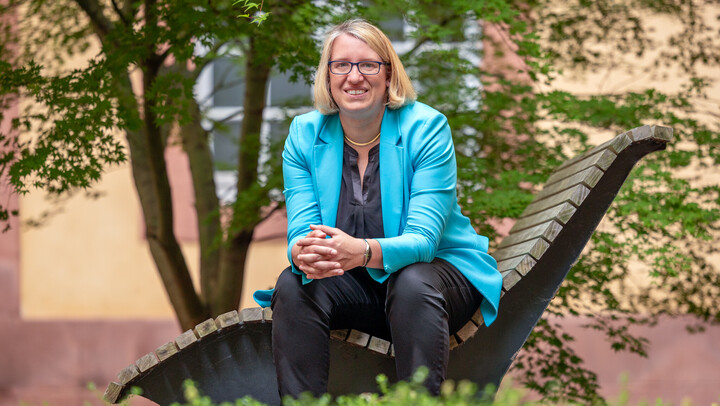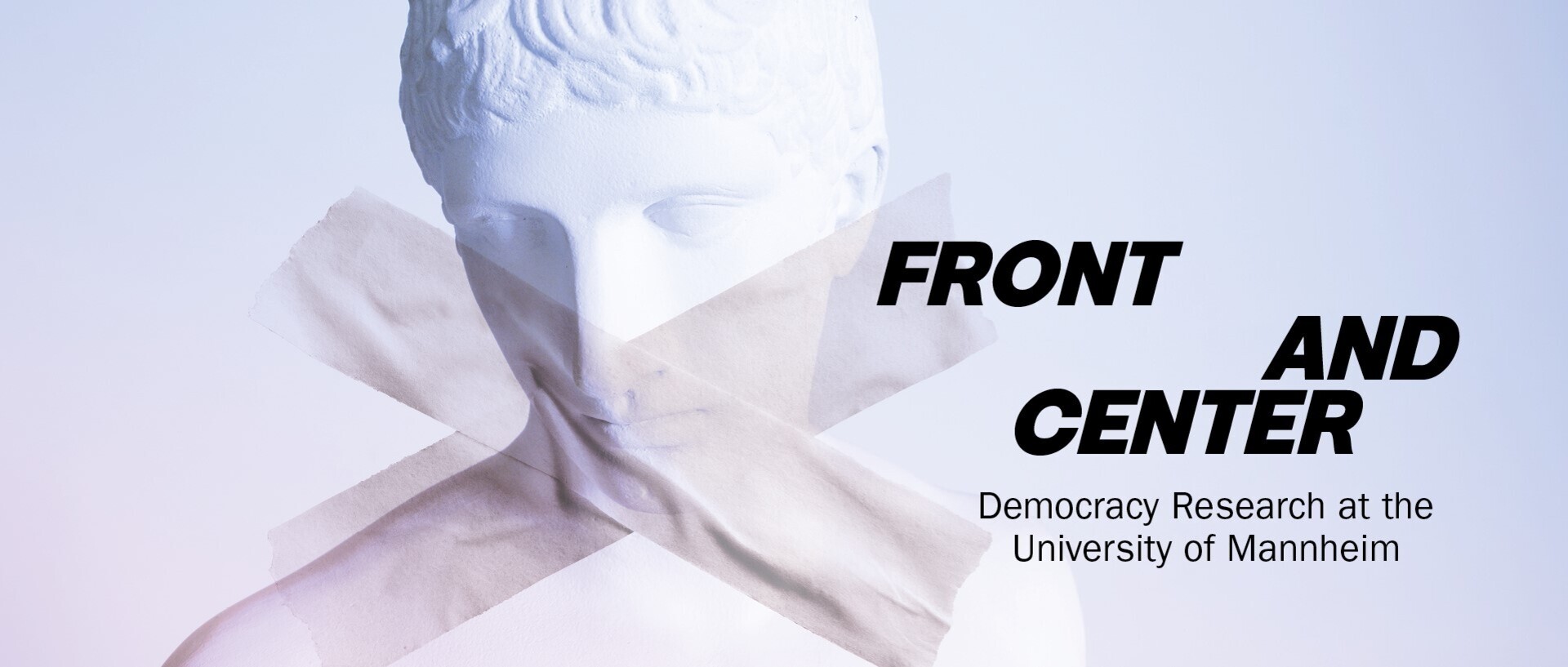Catching Up With … Dr. Melanie Seidenglanz
Mannheim alumna Melanie Seidenglanz is passionate about advancing education. During a visit to her alma mater, the project manager and Mannheim city councilor makes clear just how deeply her commitment runs.

Melanie Seidenglanz is happy to return to the Schloss for her FORUM interview. We meet in the foyer of the east wing. “Do we have time to stop by a former classmate’s office first?” she asks shortly after saying hello. Of course we have time—and it’s a warm reunion. On the way to the photo shoot, we pick up the photographer, and the two of them immediately begin reminiscing about a past collaboration. These are first clues to what later becomes unmistakable in the interview: Seidenglanz is a passionate networker. She calls herself a “Mannheim original” and seems to run into familiar faces everywhere she goes. Thanks to her open and approachable manner, it’s easy to strike up a conversation with her.
Once we reach the interview location, Seidenglanz points out that she’s frequently on campus: “I speak about my work to students in the economic and business education program, for instance, and attend events organized by the TransforMA transfer project,” says the 41-year-old. “Staying connected to my alma mater and to young people is very important to me. After all, they’re the future leaders of our society.” That’s also why she serves as a mentor for ABSOLVENTUM. Another reason: “I remember from my days as a doctoral student how great it is to have someone you can count on. I want to give something back.”
Returning to the university
After finishing her degree, Seidenglanz initially turned down an offer to pursue a doctorate at the University of Mannheim. Instead, she started working for the Baden-Württemberg Evaluation Agency, which supports universities and research institutions with quality management. “I was 23 and wanted to dive straight into the working world,” she says. The impulse is easy to understand—even as she speaks, Seidenglanz radiates energy and a willingness to take action and effect change. “Eventually, though, my involvement in academia made we want to pursue a doctorate after all,” she says. A former classmate told her about an exciting research project in linguistics headed by Professor Heidrun Kämper, which included the opportunity to do a doctorate. She got the position—along with a scholarship from the Friedrich Ebert Foundation.
After completing her doctorate, Seidenglanz stayed on with the university. She moved to the Law School’s dean’s office, focusing on accreditation, and later joined the university’s program management team. There, she made connections with regional businesses that hosted student internships. “And I really enjoyed that exchange with practitioners,” she says. One of them told her about a job opening at the Rhine-Neckar Metropolitan Region—an ideal fit, given her university background, extensive network, and regional ties. She applied and got the position.
Opportunities and education
Today, Seidenglanz serves as a project lead for labor market and education initiatives, working to strengthen the region as a center of education and research. One key focus: educational programs aimed at reducing school dropout rates. Her work brings her into contact with stakeholders from business, government, and civil society. “Every day is a little different, but we’re constantly working to improve educational opportunities,” says Seidenglanz. “That’s something I care deeply about—and I’m fortunate that it’s part of my job description.”
She has been volunteering with children since the age of 15—first as a scout, then, during her university studies, as a counselor for Caritas youth camps. “Fighting child poverty, promoting educational equity, and improving opportunities—these themes have been a constant throughout my life,” she says. One experience during her university years stuck with her in particular: “I realized that even in a wealthy country like Germany, some kids can’t join a summer camp because they don’t have enough underwear!”
Entering the World of Politics
At the same time, the local Young Socialists (Jusos) were running a campaign on child poverty. Despite studying political science and German literature, Seidenglanz hadn’t considered getting directly involved in politics. “At university, we focused more on theory than on current affairs or local politics,” she recalls. She told a classmate—who also happened to lead the local Jusos—about her frustration. That classmate invited her to an event. “And suddenly I was surrounded by familiar faces—people I knew from lectures. I felt incredibly comfortable and started getting involved,” Seidenglanz says.
That was over 20 years ago. Today, she serves on Mannheim’s city council for the Social Democrats and is deputy chair of her party’s council group. “I sort of fell into it,” she says. “But I really enjoy the work. It’s strategic, and it allows me to advocate for education in the political arena as well.” Her previous jobs in different industries, she adds, have helped: “I always say I’m a kind of translator. I try to ensure that everyone in our projects speaks the same language—and moves at the same speed and in the same direction.”
What’s next?
Thanks to her political role, Seidenglanz now sits on the supervisory boards of several companies, including energy provider MVV. “That’s not something I would’ve imagined when I started out,” she says. Her recent part-time studies in business and management at TU Kaiserslautern prepared her well. “I really value the chance to gain insight into so many different sectors,” she says. “Right now, I have the opportunity—thanks in part to my political mandate—to broaden my perspective and absorb a lot of knowledge. I guess that’s not for everyone, but I’m exactly the right person for it.”
In Melanie Seidenglanz’s life, it often seems like one thing naturally leads to another. So is this her dream job? “At the moment, it definitely feels right—especially the combination of paid work and volunteer work. And not to forget my family,” she says. What the future holds, she can’t say. But one thing is certain: it will have something to do with education.
Text: Luisa Gebhardt / August 2025
